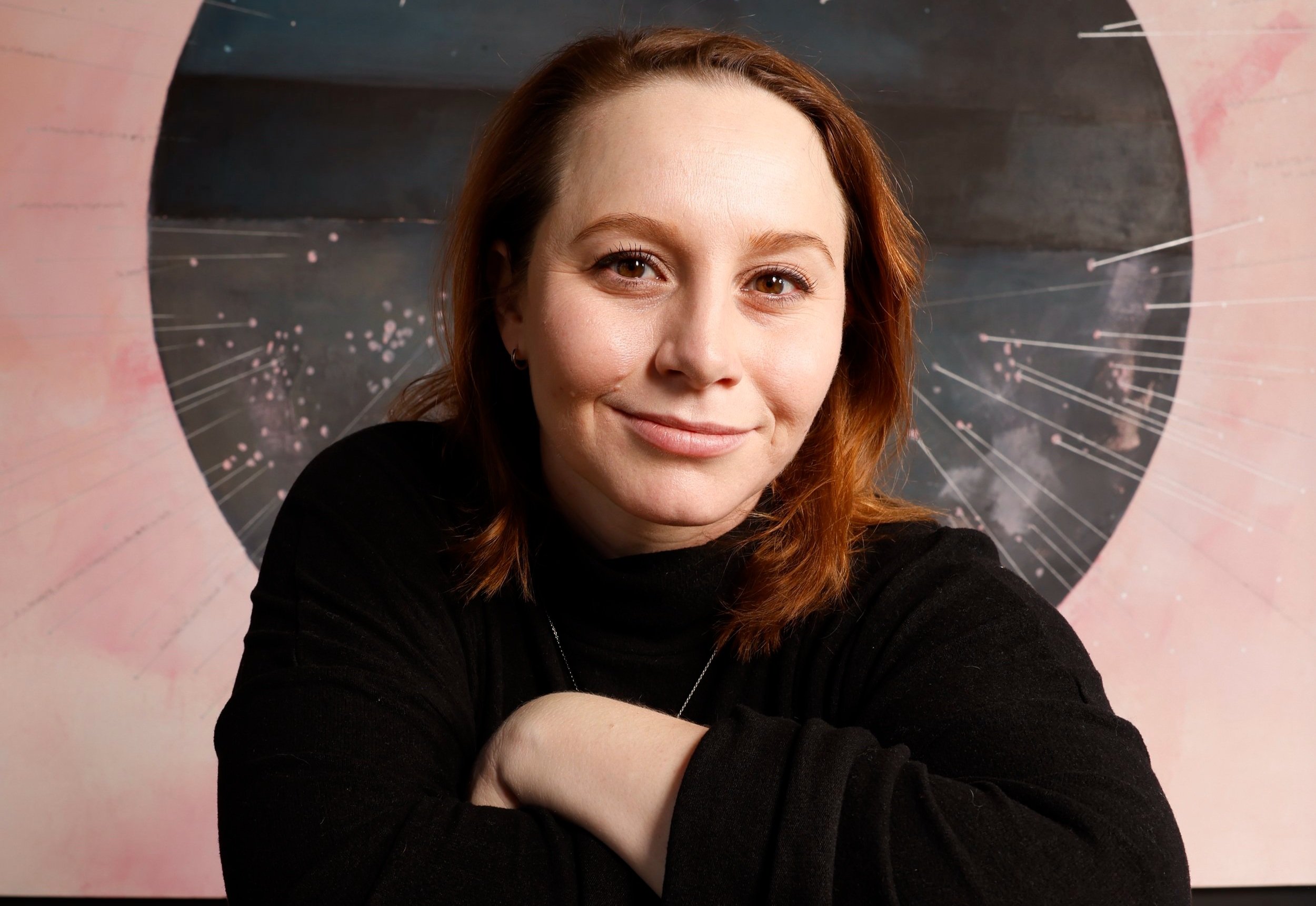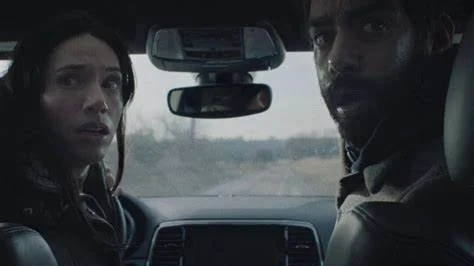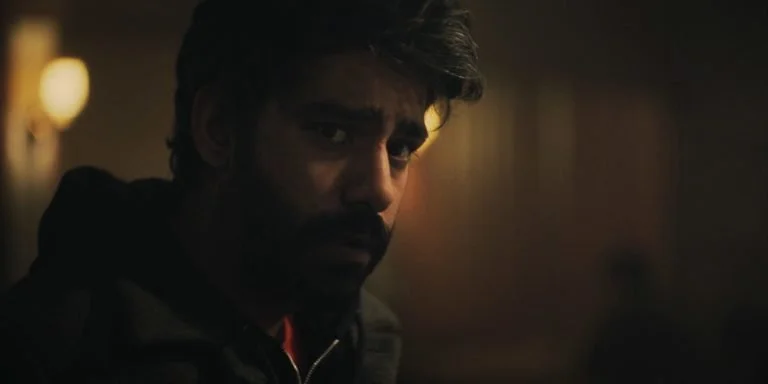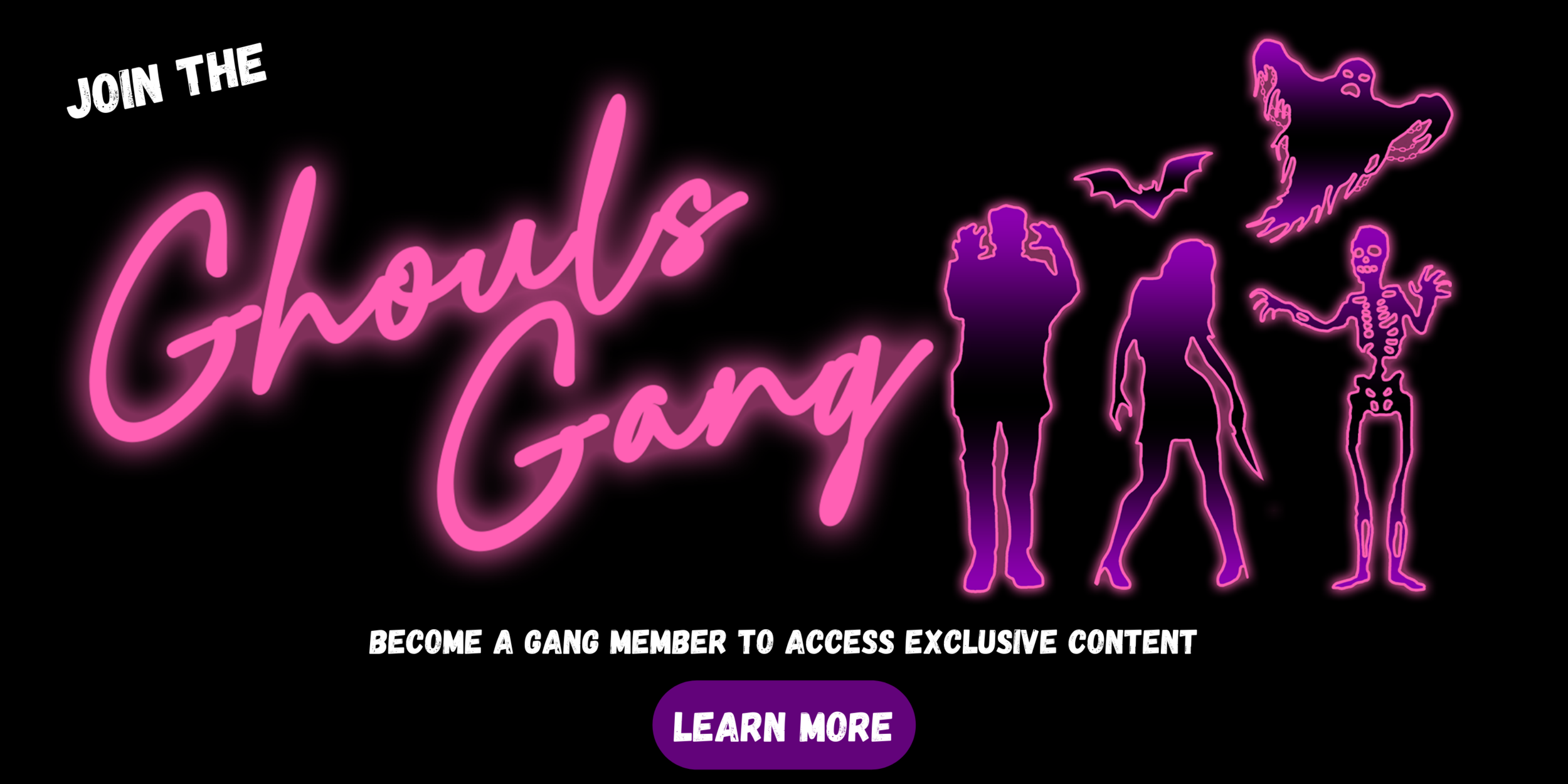[Editorial] Interview with Mali Elfman Writer and Director of Next Exit (2022)
There’s been quite a buzz about Next Exit since its UK premiere at Arrow Video FrightFest last year, and so I was very pleased when the opportunity arose for an interview with its writer/director Mali Elfman. I introduced myself and Mali told me she used to write reviews too: “I did it for about seven years,” she said; “I loved it.”
I told Mali my article was going to be for Ghouls Magazine-perhaps because Next Exit features ghosts and death (but also because a couple of the Ghouls rather fancy the leading man, Rahul Kohli) -and I asked her whether she felt the film falls under the horror label or some other genre. “I always say it’s a character study of two people with a sci-fi twist,” said Mali, “that’s also a ghost story.” Fine by me: I like horror that also sits in other boxes.
Ghouls Magazine looks at “horror through the female perspective”, so I asked Mali what that phrase meant to her. “I’ve been focused mainly for the past ten years or so on working with female and non-binary perspective in filmmaking,” she said. “Also, any voice that has been struggling to make it in the market has really been something to dedicate my time to, especially with producing and also with directing: it’s very important. I was working with Mike Flanagan a while ago; I love Mike, I love everything he does and he’s very good at what he does, but those weren’t the stories I wanted to tell, and he didn’t really represent the filmmakers I wanted to get behind. I broke away from that and started Fun Size Horror and made a tonne of short films with filmmakers. I worked with Karen Gillan, and that’s when we started The Party’s Just Beginning. More recently, I’ve worked with Laura Moss, and we just premiered Birth/Rebirth at Sundance. So it’s been very important to me to try to find horror (which was traditionally a very male gaze) and help redefine it.” I couldn’t help remembering Jason Blum’s infamous 2018 comment about there not being “a lot of female directors period, and even less who are inclined to do horror.” Mali shook her head in tired frustration. “I think most of us just lit on fire immediately, just burst into flames with rage: it was not a smart thing to say in the slightest.”
LISTEN TO OUR HORROR PODCAST!
As Mali had mentioned Birth/Rebirth a minute earlier, I asked how that premiere had gone down. “I think it went very well,” she said. “I’m so proud of Laura Moss: it’s been seven years in the making and in honing the script down; and there were so many false starts: we almost shot this right at the top of COVID and had to pause for that. So it’s been such a long time in the making and it’s a film that raises incredibly difficult discussions about motherhood, about non-traditional motherhood which is important. When I read it, I immediately wanted to get behind it and support it; and I honestly wasn’t sure if people would get behind it, and for it to get such a warm reception kind of means the world to me and shows that we are ready to evolve and change and tell these new stories, and that we really need it right now. Birth/Rebirth raises conversations that ten years ago people were telling me audiences don’t want and now I can tell you they do: this is a time for it, and I’m very excited.”
On a related note, I asked Mali what it had been like to move from producing films to finally directing one of her own. “You know it’s really wonderful and it’s so much easier,” she said with a laugh. “It’s not easy to direct, but what I always say is that the director tells everybody what they need and then it’s the producer’s job to make sure all of that happens. So you have to have a clear vision as a director; but I’m not just going to direct anything: it has to be something I’m emotionally connected with and respond to. This wasn’t my story in that I haven’t crossed over to the other side, of course, and there isn’t a doctor yet… actually I have randomly been sent information about three doctors that are literally trying to do what my Dr Stevensen has done, and wow! this is a little more realistic than I thought! I thought I was making up a fantasy! Anyway, it came from my heart, my soul: it really is me on a platter… which was terrifying, but also incredibly intuitive. So because I’d worked on so many productions, I knew how to prep myself, I knew how to literally build up the stamina for the days, how to prep my script; and then I just trusted myself to get through it. I didn’t know I could, but I did!”
Kind of looks like she did! I wondered whether Mali was likely to go back to producing other people’s work, or stick to her own now. “Well I went back to it straight after this one to make Birth/Rebirth with Laura,” she clarified. “I’m not producing a lot, and I’m producing for specific directors I have a rapport with and I really want to support; because I do love getting stories out there into the world, and I am kind of picky about what I want to direct. So I’m taking my time, but I am very excited to direct another film; hopefully sooner, rather than later.”
I was a bit wary to ask, but wanted to know where the Next Exit story had come from. Was it an interest in ghosts, an interest in death, or something completely different? “Keep going!” said Mali. “All of the above! I think for me, I had experienced a death in my life personally, and it didn’t make sense to me that someone who had been so important to me, had been such a bit figure in my life was here one second and then gone the next. I didn’t want to accept it, and so I wanted to create a world in which that wasn’t true, and in which I could still access them and they could access me. I remember I left that day and when I got home, I said ‘if you’re a ghost, please haunt me, please come back’. That was all I wanted. It’s funny: I think both Rose [played by Katie Parker] and Teddy [Rahul Kohli] are both me, but they’re me in my twenties, and so it’s funny getting to the other end of my thirties and looking back on how I processed these difficult emotions and conversations that I didn’t know how to process. So I created that world in which something that I wanted to be real was real, and then I let these two characters just take a journey through it.”
From the opening ten minutes or so of Next Exit, I kind of expected the story to be somewhat morbid, but it didn’t turn out that way at all. I asked Mali what she did to take control of that tone. “I honestly think if you’re having a conversation about suicide,” she said, “about assisted suicide, depression, all those topics; that you take on the responsibility of allowing there to be light and hope at the same time. I’ve gotten critiqued a number of times about wanting a darker ending, but no: it’s imperative that you show people who go through these experiences that there is something to look forward to. I felt a huge responsibility towards that, and I really don’t care about those people who say they want a dark ending: that’s the wrong choice and completely irresponsible. I see people dealing with the subject matter who go that way and I really wonder what they’re trying to say. For me, that was always very important. I always try to start my projects by telling people what ride I’m going to take them on, so that’s the long hallway and the score: I know ghosts are scary and I know there are scary things in your life that you don’t want to deal with. Then immediately, we go in and change perspectives and see that little boy: we see that what should scare him really doesn’t. And we change perspective again to someone who’s watching; and again, to see the whole world critiquing. Hopefully, what that says to people is ‘look at the things we’re afraid of in different ways and have a conversation about them’. I did intentionally want to lure people into something that was scary and tell them that we were going to look at scary things but not from a scary perspective.”
I was under the impression that Next Exit’s two leads, Rahul Kohli and Katie Parker, had worked together before, but it seems they had instead both worked with Mike Flanagan. “They had known each other, but not performed together before,” Mali clarified for me. “They definitely had a rapport and a trust in one another. When I told them each who they’d be working with, it was like ‘OK, cool,’ and there was trust for that person. Also, they had to be stuck in a car with each other: you don’t have to like one another on set, but it is really helpful in a small environment! They both had a respect for the way the other works: they both work very differently, and yet had a lot of respect for each other and so came together in a beautiful way. Katie wanted to go through every single line, every single comma, with in-depth prep; and Rahul wanted the macro view, about what happened before the film started, what happened outside of it, so that he could inform his character. You throw those together---the looseness of Teddy and the tight coil of Rose---and you just get this explosion. The second I saw they were doing things so differently, I was really excited, because that’s where you get interesting chemistry. If they both do the same thing, it can get dull, but because of their differences, it was fun.”
Mali had mentioned the wider world just then, and I wondered whether she had thoughts of what was going on in that world: about other people going forward to the doctor’s experiment; what happens if the experiment is closed down, and so on. I asked whether threads like those are written down somewhere or kept swirling round her head. “Oh my God, I have a huge mythology!” said Mali. “I have all of Dr Stevensen’s work figured out. There was actually more in the film: there was another scene I have with Karen [who played Dr Stevensen] at the end, but you’re on the journey with the two main characters, so I trimmed back the other parts like that. We called the company No Traffic for Ghosts, because it’s not like you just go to the other side and there are ghosts everywhere: ghosts are created from trauma and the inability for the living to let go, or something connecting them; and you don’t go into a ‘world’, but rather something you have created in your mind, some piece of you that goes on. It’s not a traditional after-life, and I had planned to play around with that. So when Rose crosses over, she goes into her space (and I do believe that everyone would do that in their own way) and it’s because of things she needs to sort out in her life that she has that in general.”
Rose’s “journey” was interesting, for sure, but I wanted to steer the conversation away from spoiler territory (the only spoiler I really want to provide is that the dog does not die in this film). Nevertheless, I couldn’t help but comment that when I watched Next Exit and observed where Rose was heading, I kept thinking about Soylent Green. (“A couple of other people have referenced that,” Mali said with a grin.) As I watched the film, I had said to myself ‘I wonder if the writer had seen Soylent Green one day and figured people wouldn’t do it like that; I’ll write how they would do it.’ “Maybe that was somewhere in my psyche and I wasn’t aware of it,” Mali mused, “but honestly, David Lowry’s A Ghost Story was a huge influence for me; I love that film more than anything. Dinner in America was another inspiration, and Trains, Planes and Automobiles. Oh and Another Earth: the idea that you take one thing, shift it, and then see how the world responds.”
Mali’s mind is clearly full of inspirations and ideas: I asked what is next for her career. “Hopefully, directing again,” she said. “Currently in pitch mode. We just released Birth/Rebirth at Sundance, so hopefully I have some sleep to look forward to. I just want to make more stories that we haven’t seen before, tap into more emotions that hopefully people can resonate with, and find more ways of doing that. I’ll do that in whatever way I can.”
Blue Finch Film Releasing presents Next Exit on digital platforms 20 February.



![[Ghouls Podcast] Maniac (2012) with Zoë Rose Smith and Iona Smith](https://images.squarespace-cdn.com/content/v1/5fe76a518d20536a3fbd7246/1696356006789-NYTG9N3IXCW9ZTIJPLX2/maniac.jpg)
![[Ghouls Podcast] Ghouls Watch: Bucket List of the Dead, Blood Drive, Candy Land & more](https://images.squarespace-cdn.com/content/v1/5fe76a518d20536a3fbd7246/1696261000263-58VQFOVWPE363OFGP7RF/GHOULS+WATCH.jpg)
![[Ghouls Podcast] Tender Is The Flesh with Zoë Rose Smith, Bel Morrigan and Liz Bishop](https://images.squarespace-cdn.com/content/v1/5fe76a518d20536a3fbd7246/1693769261264-MS4TS4Z4QC1N15IXB4FU/Copy+of+%5BJuly%5D+Antiviral%2C+possesoor+and+infinity+pool.jpg)
![[Ghouls Podcast] Antiviral, Possessor & Infinity Pool with Zoë Rose Smith, Amber T and Iona Smith](https://images.squarespace-cdn.com/content/v1/5fe76a518d20536a3fbd7246/1691238787263-XYRKXW2Z7RWI9AY2V2GX/%5BJuly%5D+Antiviral%2C+possesoor+and+infinity+pool+%281%29.jpg)
![[Ghouls Podcast] Ghouls Watch: Body Horror Recommendations](https://images.squarespace-cdn.com/content/v1/5fe76a518d20536a3fbd7246/1691238687847-L9U434I1U4HZ3QMUI3ZP/%5BJuly%5D+Ghouls+Watch+-+Website+%281%29.jpg)
![[Ghouls Podcast] The Last House on the Left (2009) with Zoë Rose Smith and Jerry Sampson](https://images.squarespace-cdn.com/content/v1/5fe76a518d20536a3fbd7246/1687863043713-54DU6B9RC44T2JTAHCBZ/last+house+on+the+left.jpg)
![[Ghouls Podcast] Ghouls Watch: Bones and All, Suitable Flesh, The Human Centipede & more](https://images.squarespace-cdn.com/content/v1/5fe76a518d20536a3fbd7246/1687855203348-7R2KUSNR6TORG2DKR0JF/%5BJune%5D+Ghouls+Watch+-+Website.jpg)
![[Ghouls Podcast] 3 Original vs. Remake Horror Films with Rebecca McCallum & Kim Morrison](https://images.squarespace-cdn.com/content/v1/5fe76a518d20536a3fbd7246/1685286663069-0Q5RTYJRNWJ3XKS8HXLR/%5BJune%5D+Original+vs.+Remake+Horror+Films.png)
![[Ghouls Podcast] Ghouls Watch: The Devil’s Candy, Morgana, Dead Ringers & more](https://images.squarespace-cdn.com/content/v1/5fe76a518d20536a3fbd7246/1685284429090-5XOOBIOI8S4K6LP5U4EM/%5BMay%5D+Ghouls+Watch+-+Website.png)
![[Ghouls Podcast] The Bay (2012) with Ariel Powers-Schaub & Amber T](https://images.squarespace-cdn.com/content/v1/5fe76a518d20536a3fbd7246/1684751617262-6K18IE7AO805SFPV0MFZ/The+Bay+website+image.jpg)
![[Ghouls Podcast] The Ruins (2008) with Ash Millman & Zoë Rose Smith](https://images.squarespace-cdn.com/content/v1/5fe76a518d20536a3fbd7246/1684076097566-BE25ZBBECZ7Q2P7R4JT4/The+Ruins.jpg)
![[Ghouls Podcast] Picnic at Hanging Rock (1975) with Zoë Rose Smith & Rebecca McCallum](https://images.squarespace-cdn.com/content/v1/5fe76a518d20536a3fbd7246/1682536446302-I2Y5IP19GUBXGWY0T85V/picnic+at+hanging+rock.jpg)
![[Ghouls Podcast] Ghouls Watch: Deathproof, Child’s Play, Ghostwatch & more](https://images.squarespace-cdn.com/content/v1/5fe76a518d20536a3fbd7246/1682447065521-DWF4ZNYTSU4NUVL85ZR0/ghouls+watch.png)
![[Ghouls Podcast] 5 Coming-of-Age Horror Film Recommendations](https://images.squarespace-cdn.com/content/v1/5fe76a518d20536a3fbd7246/1681418402835-EMZ93U7CR3BE2AQ1DVH4/S2+EP5.png)
![[Ghouls Podcast] Psychotic Women in Horror with Zoë Rose Smith & Mary Wild](https://images.squarespace-cdn.com/content/v1/5fe76a518d20536a3fbd7246/1678635495097-X9TXM86VQDWCQXCP9E2L/Copy+of+Copy+of+Copy+of+GHOULS+PODCAST+THE+LOVED+ONES.jpg)
![[Ghouls Podcast] Good For Her Horror Film Recommendations](https://images.squarespace-cdn.com/content/v1/5fe76a518d20536a3fbd7246/1678634497037-W441LL37NW0092IYI57D/Copy+of+Copy+of+GHOULS+PODCAST+THE+LOVED+ONES.jpg)
![[Ghouls Podcast] Ghouls Watch: Severance, Run Sweetheart Run, Splice & more](https://images.squarespace-cdn.com/content/v1/5fe76a518d20536a3fbd7246/1677589685406-YZ9GERUDIE9VZ96FOF10/Copy+of+GHOULS+PODCAST+THE+LOVED+ONES+%281%29.jpg)
![[Ghouls Podcast] Nekromantik with Zoë Rose Smith & Rebecca McCallum](https://images.squarespace-cdn.com/content/v1/5fe76a518d20536a3fbd7246/1677422649033-Z4HHPKPLUPIDO38MQELK/feb+member+podcast.jpg)
![[Ghouls Podcast] The Loved Ones (2009) with Liz Bishop](https://images.squarespace-cdn.com/content/v1/5fe76a518d20536a3fbd7246/1676369735666-56HEK7SVX9L2OTMT3H3E/GHOULS+PODCAST+THE+LOVED+ONES.jpg)
![[Ghouls Podcast] Terrifier (2016) & Terrifier 2 (2022) with Janine Pipe](https://images.squarespace-cdn.com/content/v1/5fe76a518d20536a3fbd7246/1674478017541-0DHH2T9H3MVCAMRBW1O1/_PODCAST+NO+IMAGE+2023+EP+4+%282%29.jpg)
![[Ghouls Podcast] Final Destination 5 & Wrap-up with Ariel Powers-Schaub & Iona Smith](https://images.squarespace-cdn.com/content/v1/5fe76a518d20536a3fbd7246/1672841326335-WER2JXX7WP6PO8JM9WB2/PODCAST+BONUS+2023+%284%29.jpg)
![[Ghouls Podcast] Final Destination 3 & 4 with Ariel Powers-Schaub & Iona Smith](https://images.squarespace-cdn.com/content/v1/5fe76a518d20536a3fbd7246/1672841151148-U152EBCTCOP4MP9VNE70/PODCAST+BONUS+2023+%283%29.jpg)
![[Ghouls Podcast] Krampus (2015) with Megan Kenny & Rebecca McCallum](https://images.squarespace-cdn.com/content/v1/5fe76a518d20536a3fbd7246/1672839790368-VYX6LIWC5NVVO8B4CINW/_PODCAST+NO+IMAGE+2023+EP+17.jpg)
![[Ghouls Podcast] Soho Horror Film Review with Hannah Ogilvie & Caitlyn Downs](https://images.squarespace-cdn.com/content/v1/5fe76a518d20536a3fbd7246/1672840392291-XQGQ94ZN9PTC4PK9DTN1/_PODCAST+NO+IMAGE+2023+EP+16.jpg)
![[Ghouls Podcast] Final Destination 1 & 2 with Ariel Powers-Schaub & Iona Smith](https://images.squarespace-cdn.com/content/v1/5fe76a518d20536a3fbd7246/1672841181605-5JOOW88EDHGQUXSRHVEF/PODCAST+BONUS+2023+%282%29.jpg)
![[Ghouls Podcast] The Borderlands (2013) with Jen Handorf](https://images.squarespace-cdn.com/content/v1/5fe76a518d20536a3fbd7246/1672839985316-KPLOVA9NGQDAS8Z6EIM9/_PODCAST+NO+IMAGE+2023+EP+15.jpg)
![[Ghouls Podcast] Soho Horror Film Preview with Hannah Ogilvie & Caitlyn Downs](https://images.squarespace-cdn.com/content/v1/5fe76a518d20536a3fbd7246/1672840411619-IP54V5099H6QU9FG4HJP/_PODCAST+NO+IMAGE+2023+EP+14.jpg)
![[Ghouls Podcast] Halloween Special: 5 Horror Films to Watch This Halloween with Joshua Tonks and Liz Bishop](https://images.squarespace-cdn.com/content/v1/5fe76a518d20536a3fbd7246/1672840351086-2AWFIS211HR6GUY0IB7I/_PODCAST+NO+IMAGE+2023+EP+13.jpg)














![[Editorial] Oscar Nominations 2026: Where to stream all the horror picks](https://images.squarespace-cdn.com/content/v1/5fe76a518d20536a3fbd7246/1769113319180-4INRRNMZK4DZLHRSUXX5/rev-1-GRC-TT-0026r_High_Res_JPEG-1024x372.jpeg)
![[Editorial] Soho Horror Film Festival: Interview with Aimee Kuge on Cannibal Mukbang](https://images.squarespace-cdn.com/content/v1/5fe76a518d20536a3fbd7246/1701808004722-9M8SZ2UXY52QBQBR4NTI/img20230818_15150780.JPG)
![[Editorial] 10 Films & Events to Catch at Soho Horror Film Fest 2023](https://images.squarespace-cdn.com/content/v1/5fe76a518d20536a3fbd7246/1700819417135-299R7L4P0B676AD3RO1X/Screenshot+2023-11-24+at+09.41.52.png)
![[Editorial] 9 Horror Nintendo Switch Games To Play](https://images.squarespace-cdn.com/content/v1/5fe76a518d20536a3fbd7246/1697214470057-3XZXX8N4LYIMDFWS6Z3P/Screenshot+2023-10-13+at+17.20.13.png)
![[Mother of Fears] Mothering in Silence in A Quiet Place (2018)](https://images.squarespace-cdn.com/content/v1/5fe76a518d20536a3fbd7246/1696445921315-HZJ2DZYQIH6VVWXBO2YL/Screenshot+2023-10-04+at+19.52.29.png)
![[Event Review] Highlights from Mayhem Film Festival 2023](https://images.squarespace-cdn.com/content/v1/5fe76a518d20536a3fbd7246/1697624582491-MPT2VB9RRGU6OG7L6UKL/Mayhem+2023.jpg)
